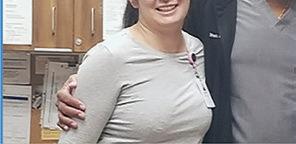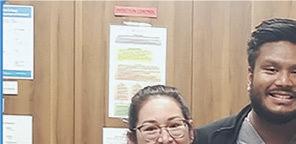A Salute to Nursing

National Nursing Week is May 8-14, 2023














































ELIZABETH IRELAND

National Nursing Week recognizes nurses for their dedication, courage and commitment — so evident during the COVID-19 pandemic of the past three years. The theme of this year’s week is “Our Nurses. Our Future: Celebrating the many roles that nurses play in a patient’s health-care journey.”
As the professional voice of Canadian nursing, the Canadian Nurses Association (CNA) represents registered nurses, nurse practitioners, licensed and registered practical nurses, registered psychiatric nurses, retired nurses, and nursing students across all 13 Canadian provinces and territories.



CNA president Sylvain Brousseau, a nurse since 1993, has a professional background in acute care, community health and infection prevention. He earned his PhD in nursing sciences from the Université de Montréal and is currently an associate professor in nursing sciences at the Université du Québec en Outaouais. In 2022, Brousseau received a medal for his academic engagement from the assembly of governors of the Université du Québec.
“National Nursing Week is an opportunity to recognize and respect nurses for their courage, expertise, leadership, unique competencies and commitment. During the pandemic, nurses have been on the frontlines, working tirelessly to care for patients and to help contain the spread of the virus. Nurses have faced unprecedented challenges, often putting their own health and safety at risk, and have worked long hours under stressful conditions,” says Brousseau.
Across Canada, nurses play key roles including primary care, acute care, palliative care, public health, occupational health, school nurses, nurse managers and nurse practitioner-led clinics.




“Using a nursing lens, nurse practitioners bring together biomedical knowledge with their unique expertise and competencies,” says Brousseau. “They have additional education and experience, which enables them to autonomously diagnose and treat illnesses, order and interpret tests, prescribe medications, perform medical procedures, address needs relating to a person’s physical and mental health, and gather medical history. Nurse practitioners provide health and lifestyle promotion, disease prevention and illness management for individuals, families and communities. Nurse practitioners also have the professional autonomy to manage and lead a community health clinic.”


Hospice and palliative care nurses provide care and support to patients nearing the end of their lives. Palliative care involves managing pain and other symptoms, while providing emotional and spiritual support to patients and their families.


Occupational health nurses work in industry to ensure that workers are healthy and safe, providing health education, managing injuries and ill-












nesses, and promoting healthy behaviors.







“Nurses and primary care nurses play diverse and critical roles in urban, rural and remote communities. They work in a range of settings — from community hospitals and ambulatory clinics to schools, community centres and individual’s homes. Nurses also develop public health approaches to improving the health of underserved or marginalized populations,” says Brousseau.


He notes the importance of nurses advancing academic research and health policy. These nurses develop and conduct research on different social or clinical issues, such as nursing retention, randomized clinical studies and other areas that can help shape the overall health-care system and bring the patient experience to the table.

What do nurses need from the Canadian public to continue providing patients with crucial care? Brousseau says they need respect, collaboration, support, trust and recognition to really thrive. He says that nurses are still feeling the pressures of the pandemic — including staff shortages, workplace burnout and a desire to leave a stressful hospital environment for other employment.
According to Brousseau, nurses deserve to be treated with respect and dignity by the patients and families they serve. This means acknowledging their expertise, valuing their contributions to health care and intolerance for harassment or violence against nurses from patients or their families.

“We have zero tolerance for violence against nurses. It’s unacceptable,” says Brousseau.


Collaboration is a big part of effectively providing patient care. This includes patients following medical instructions, providing an accurate medical history and adhering to their treatment plans.
Nurses need support from Canadians to maintain their own physical and emotional well-being. This means providing a safe and healthy work environment and offering resources for stress management. As well, nurses need the trust of Canadians to effectively carry out their duties by trusting their expertise, competencies, clinical judgment and decision-making abilities.
Acknowledging nurses’ contributions to the health-care system and celebrating their successes are great ways to recognize the importance of the nursing profession. Brousseau emphasizes that nurses need, and appreciate, recognition for their hard work and dedication to the Canadians they serve.
“Without nurses, there would not be a functioning health-care system in Canada. Nurses are an essential part of the health-care system, and their work will always be critical to the health and well-being of individuals and communities,” Brousseau says. Find out more about National Nursing Week and the Canadian Nurses Association by visiting the website cna-aiic.ca.
THIS SPECIAL FEATURE WAS PRODUCED BY CONTENT WORKS, POSTMEDIA’S COMMERCIAL CONTENT DIVISION.








The year was 1918 and the Salvation Army had decided to purchase a large home on Crawford Avenue in Windsor, responding to the need for more hospital beds in the growing city.
Two years later, Salvation Army Grace Hospital would become the Salvation Army’s first general hospital in Canada. Over the years, Grace Hospital would grow from its original 28-bed maternity facility to a 122-bed general hospital. New wings were added in 1942 and 1945. In June of 1960, a fire destroyed much of the hospital, so a new, five-story facility was built and opened in 1966.
What might be most memorable, and beneficial, to the region about Grace Hospital was its nursing program, which also opened in 1920. To manage the burgeoning numbers of incoming nursing students, Grace Hospital’s School of Nursing added a nursing residence in 1954 and graduated nearly 1,600 students
until the program moved to St. Clair College in 1973.
One of those nurses was the beloved Lois Fairley. Fairley graduated from the hospital’s nursing program in 1955 and spent her career serving patients at Grace Hospital, first as a nurse and then head nurse. She also served on the provincial board of directors of the Registered Nurses Association of Ontario (RNAO), was president of the Ontario Nurses Association and a member of St. Clair College’s nursing program advisory committee. Fairley died in 2007 and in her honour, the RNAO instituted an award in her honour: the Lois Fairley Community Service Award.
“There’s a common thread among nurses our family knows all too well,” says Fairley’s son, John.



“We always knew there was no clock with my mother. She would get up at 5:30 in the morning to be in for seven as a head nurse at Grace Hospital, and it could be a seven-hour shift or a 12-hour shift

or a 14-hour shift, but it didn’t matter. She had to be there.
“We weren’t the family who wondered what was for supper at four o’clock because mom got home when she got home, when her job was done.” Fairley adds, “There’s a sensitivity I have now, something I think we don’t understand until we’re adults, to the kind of selflessness this profession has.
“Having my father on shift work at Hiram Walker security, and my mother in a day job which was supposed to be from seven to three but ended up being seven to whenever… there are a lot of families in our community that are the sons and daughters or spouses of nurses, and I’ve learned that we must have a bit more grace in our lives for these individuals.
“We can all learn to be as compassionate and enduring as they are.”
Through the years, the Lois Fairley Nursing Award accepted nominations for nurses who were recognized to have “had extreme dedication and loyalty that really, all nurses have,” explains Fairley. But in 2021, rather




than granting the award to a single nurse, the RNAO decided to acknowledge all nurses throughout the county, because of the collective commitment among thenm all to join in the fight against COVID-19.
And then in 2021, Fairley says the nominations that came in seemed to be following a trend. The nursing community wanted to tip a hat to nurses coming from and returning to every sector: nursing homes, vaccine centres, home care groups and hospitals.
“There were so many nurses who came back, the ‘golden girls,’” he says. “(They were) the ones who rolled up their sleeves and returned to where they worked for 20, 30 years and said, ‘I can still give.’”

This year, the Lois Fairley Award returns to acknowledge an individual, someone who has been recognized for impacting the life of a patient, a family, their workplace or their community.
John says that it is “wonderful there’s a whole week of celebrating nurses,” and that for him and his family, this award is a continual
reminder of what nurses give every day, “just as my mother gave.
“It’s an honour that there are nurses who can be celebrated in my mother’s name,” he continues. “But they’re also sharing this award with people and caregivers from all
over Windsor-Essex for whom the light doesn’t necessarily shine.
“As a family, we’re honoured to be able to help tell somebody’s story, to shine that light and to say thank you.”
The 16th Annual Lois Fairley Nursing Award takes place during Nursing Week, May 8 – 14. For details, visit windsoressexrnao.org.

We can all learn to be as compassionate and enduring as they are.
In March 2022, Inspire Primary Health Care reported that 44,000 Windsor-Essex residents did not have a family doctor. That’s a significant increase from the same month in 2020 when 36,000 individuals reported being without a primary care physician.
While many Windsor-based doctors and members of the Ontario College of Family Physicians are lobbying for solutions to address that shortage and the issue of access to primary care, what many don’t know is that a viable alternative to a primary physician is a nurse practitioner.
Nurse practitioners, or NPs, are advanced practice registered nurses who have received additional education and training to be able to provide primary care to patients. They’re a practical resource for many communities with limited access to general doctors.
NPs like Nancy Mahon, receive advanced training that permits them to diagnose and treat a wide range of common health problems.
An NP may have a master’s or doctoral degree, and have taken course work in physiology, anatomy and pharmacology, undergoing extensive clinical training and passing
national certifications to practice.
Acknowledging the shortages of primary care physicians in “various pockets of Ontario,” says Mahon, “there’s a big crisis in some communities in terms of seeking health care.
“What some may not know is how to go about seeking a nurse practitioner who’s accepting patients, a professional who can be a really valuable resource.”

interest in the profession as well.
“I think more people are becoming more mindful of the imprint the nurse practitioner has in communities, and how nurse practitioners can and do alleviate the burden on the health-care system as a whole,” she says. “Nurse practitioners provide accessible health care, which is a really big barrier for some people, especially those who need timely care.”
there may be a dietician, a physiotherapist, or social workers, are also becoming more prevalent.
“And this is all good news because it means increased access.”
Although she runs her own practice now, for a decade Mahon worked in such a clinic alongside numerous health-care professionals dedicated to providing patients with exemplary care. The quality of care that one receives from a nurse practitioner, she says, is equivalent across the board and in any setting.

depth one-on-one, so I can investigate a lot deeper what the current health issue is or seems to be. In this model, you’re not struggling with long wait times.”
Currently, there are 6,000 nurse practitioners licensed to practice across Canada. And the number is likely to grow, says Mahon.
Mahon, who sees patients through her own private practice, Functional Health Practitioner, suggests individuals visit the Windsor-Essex County Health Unit Website which lists nurse practitioners and doctors who are currently accepting patients.
Mahon says more and more people are becoming aware of the nurse practitioner which will help alleviate the stress on the community – and perhaps generate increased
According to the Canadian Nurses Association, the first nurse practitioners began practicing medicine in the 1960s, but Mahon says it’s only “fairly recently that more and more NPs are being incorporated into various health settings, like family health teams and community health centres.
“Nurse practitioner-led clinics, which are run by completely autonomous nurse practitioners who oversee a team-based setting where
For National Nursing Week 2023, the Canadian Nurses Association asked its membership to take to social media to celebrate the many roles that nurses play in patient care and throughout their health-care journey.
They asked nurses to bring “to light the courage and commitment that nurses work under every day” and to show the general public the valuable role that nurses play in the community.
For registered nurse Jody Cabrera, a Windsor resident and one of thousands of Canadian nurses who work across the border in Detroit, the ability to share her experiences and insight as a nurse on social media has had its benefits — and its drawbacks.
“There’s this intersection of our work (as nurses) and technology which I think has drastically transformed how people see health care,” says Cabrera, who is studying for her master’s degree. “People are more aware in general, but what’s hardest to do is to be able to point out misconceptions or errors in knowledge in a way that people can understand it… what’s really tough is that I wish people had more trust or respect for the information I provide, the truth that I can share because I’ve taken an extended science degree, rather than watching all these people screaming at each other or warning each other about incorrect information.
“Sometimes I feel like I can’t be fully plugged in because I don’t want to be part of the noise. But I wish people understood that (as a nurse), I’m not pushing an agenda – I work in a field of science and want to share new information as it becomes available because there’s a reason we do what we do. We’re constantly re-evaluating what we know to be true for the benefit of the community at large.”
don’t have any motivation to do this, as in I’m not getting any money or winning prizes for sharing truth. I’m not trying to push politics.
“For most people in my field, it’s similar. We’re voices that are out there offering trustworthy information for a lot of people, giving insight into our experiences.”
The College of Nurses of Ontario seems to share her sentiment. In January 2023, it published a video on its website cno.org urging nurses to reflect before their post, and to recognize that their responsibilities do not end at the walls of the hospitals and clinics in which they work. Because social media posts can and do spread very quickly, it’s an opportunity for nurses to communicate positive, encouraging information, amplifying the value of their work and celebrating the successes of those in their field.
She explains that nurse practitioners typically appear in one of three settings: a hospital, a nurse practitioner-led clinic or an independent private practice. The only difference is that independent nurse practitioners are unable to file for OHIP, which means that a patient’s care would need to be covered by private insurance or paid for out-of-pocket, she says.
“It is premium health care but the greater benefit to this is the access,” says Mahon. “This model means I am not so busy that it takes forever to get an appointment with me. I provide weekend hours, and in some cases evening hours. People can email or text me if they need to access care, and I have the opportunity to do in-
“The opportunities for learning and to provide care are so great in this field. For me, I took additional studies in functional medicine, which means I focus on getting to the root of the problem. And there may be some investigations that aren’t covered, but I’m taking health care beyond the prescription – the whole person, and all the dynamics that affect them and their health,” she says.
“I know that there are so many (people) frustrated with the healthcare system, through no fault of the incredible professionals who are out there caring for patients every day,” muses Mahon. “But (in this profession), we can employ critical thinking. We have the knowledge base and experience that is very similar to a general physician. And we have the deep compassion and empathy and all the traits needed to care for someone.
“We were nurses first.”
Still, Cabrera says that there are many benefits to seeing nurses make regular appearances on social media, especially for those who may not have a nurse or other medical professional in their own family or circle of friends.
“If you see a nurse commenting or posting, you can know that you have at least one trusted source, somebody who’s in the trenches in real time,” says Cabrera. “For me, I
“I wish it was as easy as bringing truth to people and having them go, ‘Oh, okay, I’m going to completely throw my old perceptions and belief systems out the window because this person with a science degree can be trusted,’” says Cabrera with a laugh. “It can be very hard to change the mind of a person who’s convinced otherwise.
“But what I really would love for people to know is that even we, as nurses, read something new and crazy, but we have a responsibility to look it up so we’re not limited to the echo chambers of our own beliefs. That’s both the downfall and
strength of social media… as more information becomes available, we must be responsible for sharing what we know, scientifically, to be true.”
Cabrera says that while she’s been cautious online, she takes any opportunity to advocate for her profession, especially by questioning content that may reflect poorly on the nursing and medical profession. She’s also thoughtful about exactly how and what she posts, knowing that although her social profiles are set to private, there’s a
chance that information could end up public, so she’s consistent about how she represents her knowledge and her expertise.
“There really are a lot of advantages for nurses (in social media),” says Cabrera. “We have an unprecedented ability to discuss and share and provide access to information to the general public in real time.”
But the best part is to share positivity and truth – which is why, she says, she became a nurse in the first place.
Local nurse shares ‘trustworthy information’ and insights into experiences on social media
I work in a field of science and want to share new information as it becomes available because there’s a reason we do what we do.
Nurse practitioners provide accessible health care, which is a really big barrier for some people, especially those who need timely care.
Over the years, the nursing profession has come a long way in terms of recognizing the importance of mental health and addiction recovery. It’s evolved to include more specialized training to better serve patients struggling with mental health concerns and addictions.
According to Elizabeth Dulmage, executive director at Brentwood Recovery Home, nurses have always been incredibly compassionate and sensitive to the needs of those challenged with addiction. They walk side by side with their patients on their road to recovery.
to work alongside our addictions physician to manage some of what we call opioid agonist therapy, which is part of a harm reduction strategy.”
Dulmage observes that early in her career as a public health nurse, a common practice was for nurses to visit people with diagnosed mental illness at home. Today, she says, “the level of complexity, and our increased knowledge of how much of a role trauma plays in addictions has really influenced how much we, as nurses, and the health-care community as a whole, pay attention to the biology, psychology and the spirit of the client who we’re serving.
“There’s a myriad of different substances we’re dealing with. We have a very concerning level of homelessness. There are unknown substances that are contaminating the drug supply,” she says.
It’s not a character defect. It’s not a choice. These people truly are ill. And nurses can see that.
But Dulmage says that today’s nurses are even more aware of the plight of those struggling with addiction, and are more prepared to help their patients, even though the ailment remains largely misunderstood by the public.
“Mental health is definitely coming to the forefront, but from the perspective of those in the nursing profession, most audiences haven’t really yet come to understand what it takes to manage and to help people in recovery, and what (addiction) even really is,” she says. “As nurses, some of the challenges that present for us, both from the treatment and resourcing point of view, is that mental (illness) comes with stigma and misperceptions, and even within the healthcare system,
tion) are truly illnesses and may require prescriptive treatments and a robust understanding of treatment,” she adds.


“There’s a complex physiological and neurophysiological component that contributes to these diseases… it’s not a character flaw. It’s not a character defect. It’s not a choice. These people truly are ill.
“And nurses can see that.”
Dulmage shares that for many suffering from addiction, physical ailments are “a real manifestation – like anybody else experiencing something physical, they may be recovering from one thing, and some other ailment occurs. It’s the same thing for people recovering from addiction,” she says.

“But in many cases, because of the nature of this disease, they’ve not had good primary care.”
At Brentwood, Dulmage explains that nurses are ready and waiting
established a medical mobile clinic with the Windsor-Essex Ontario Health team, which is “an amazing partnership,” says Dulmage.
“They’re here once a month and provide many of the primary care





might be that they say, ‘This client needs to have their blood pressure looked at,’ or ‘this client has some skin wounds that need to be attended to,’ or ‘this patient has some digestive tract issues.’

“For our nurses,” she says, “it’s about ensuring that they have support, to work with primary care to address any needs and medications,
“And the results can be deadly. So on our part, we have had to employ some really aggressive treatments, and as a nurse, it can be very hard to see. But our goal is to support a person in being able to maintain being clean and sober –so no matter how sad, it can be incredibly rewarding.”
Tracey Seguin, a registered practical nurse at Brentwood, agrees. But she says that while the changes she’s seen over her 30 years as a nurse have been alarming, there’s a light in the darkness.
“You know what’s been most gratifying to me as a nurse? It’s to see the people get well,” says Seguin, an alumna of the Brentwood program.
“If you look at people’s faces when they walk in, if you were to take a picture of them and look at their (medication) sheet, it’s a totally different picture after we’ve worked with them,” she says.
“Their faces change. They start doing their hair again. You can physically see their self-worth improving.
“For me, as someone who’s both a nurse and someone who’s been through it, there’s nothing like knowing you’re giving a person comfort, and ensuring them they’re not alone.”
The Un iversity of Wi ndsor ’s Fa cult y of Nu rs ing re cognizes and cel ebrates nurses during Na tional Nu rs ing We ek and throughout the year
“We continue to raise the bar high in nursing education with a focus on student experience, as our number one priority is to prepare tomorrow’s nurses to succeed and flourish in a challenging profession,” says Dean Debbie Sheppard-LeMoine.
We are sharing three stories of how UWindsor nursing educates and develops our students to become impactful contributors to health care. We are grateful to all nursing professionals for their ongoing dedication and commitment.
Th e nu rsi ng pr ofe ss ion, such a vital par t of our health-care system, has bee n challen ge d by the COVID -1 9 pande mic. At trition , whe ther due to widespread burnout or early re tirement, has created a void; young nurses are mos t at ri sk f or negative health consequences due to work stress
Nu rsing professors Jo dy Ralph and La urie Fr eeman, along with lead researcher Dana Ménard and her colleague in psycholog y Ke ndall Soucie, are de veloping simulation modules to prepare graduating nurses entering the workforce for moments of extreme anxiety

“By having the nu rsi ng gr ad uates participate in mock scenarios close ly simul at ing real world circumstances, we better equip them to handle unpla nned situ at ions,” says Dr Ralph
“For ins tance the y could be giv en imme dia te and increa sed
patient workload due to st aff absence. On to p of tha t, the y could encounter stressful moments with a patient ’s family and possible demands from other staff members. There are just so many factors that come into play unexpectedly.”
Th e 10 -week program includes such modules as: Recognizing the Effec ts of He av y Wo rkl oad s an d Ch angi ng Car e Pa tt erns, De- st igma tiz ing Me nta l He alth Is sues
Patient Mortality (end-of-life care and managing grief) and Working Ef fec tive ly on Mu ltidis cipli nar y Teams. They are delivered primarily through simulations and question-and-answer sessions
“Cur rent ly, we are buildi ng the 10 simulations and education modules and tes ting them in person with a small pilot group,” says Dr Ménard.
“T hen we will tr ansition to an online platform over the summer
so tha t the prog ra m can be offered asynch ronously and tes ted at multiple universities including the Un ivers it y of Ottawa and
Queen’s University.”
Dr Ménard adds that the module s are de signe d to bui ld resil ience and coping strategies in nurs-
ing st udents by pr ac tis ing their assertiveness and problem-solving in difficult but realistic situations. Us ing simu la tion s allows nursing st udents to learn (non-clinical) skills in a safe suppor tive and non-threatening environment.
By having the nursing graduates par ticipate in mock scenarios closely simulating re al wo rld circumstances, we bet ter equip them to handle unplanned situations.
– DR. JODY RALPHDrs. M énard and Ralph agree that the future of nursing depends on adapting to, and providing solutions for, workplace barriers and establishing blueprints that support self-care resulting in a healthy, competent, and sustainable workforce.
Registered nurse Sara Williams, a UWindsor alumna, has answered a spiri tu al c a ll to her pr ofe ssi on and her community She is an Anishinaabe Kwe from Aamjiwnaang Firs t Nation, located on the St. Clair River in the city limits of Sarnia, and belongs to the Sucker Fish Clan.
Studies in sports and recreation adminis tr at ion at La mbton College led her to a prac tic um placement in Saskatchewan, a province steeped in Indigenous culture.
While Williams was working at White Buffalo Youth Lodge for the Boys and Girls Club of Saskatoon, a nurse pr ac ti tione r encou ra ge d her to co nside r a care er in nu rsing since there was a need for Indigenous nurses.

“Duri ng my time in Saskatoon I was able to see how rich the Indig enou s cu ltur e was and how sou th er n On ta ri o com mu ni ti es
had been greatly impac ted by coloniza tion,” sa ys Willi ams “A ft er moving back home to Sarnia to begin my BScN studies at Lambton College, I wanted to see our communities rec laim our culture an d heal th y ways of being lik e I had witnessed out west.
A chance encounter with Southwes t Ontar io Abori gin al He alth Acces s Cen tre (S OA HA C) wh ile running summer da y camps for kids in her home communit y of Aam jiwnaang Firs t Na tion se t Williams on a pa th to fulf il her self- mand at e – wo rki ng with the Indigenous population.
Up on gr adua tion, Williams leaned into traditional healing obtained her colours and spirit name “tibjii ahnkwut” or Rolling Clouds, and began attending cer emon ies and other cultural events
“But really, I feel my calling kicked into high gear during the pandemic,
says Williams. “SOAHAC asked me to take on vaccination effor ts. We were the first off-reserve vaccination site in the country to service the Indigenous population.”
She sa ys the centre was overwhelmed with the communit y’s gratitude.
“We we re show n appre cia tio n with tr aditional gif ts of dreamca tchers, beadwork and sincere letters – a clear indication that they felt more comfortable with Indigenous nurses because we understood their culture and their traumas.”
No w In dig enous Curric ulum and Pe dag og y Advisor in the UWind sor Fa cu lt y of Nu rsing , Williams views Indigenous health care as a mindful approa ch and an ongoing process. Her long-term go al is to comple te her PhD with teaching and research in mind, and to crea te a cu lture-f irs t nursing theory for Indigenous Canadians.
As a child, Reem Boudali would scamper by the family tele visi on set shielding her eyes at the sight of gory medical scenes on the screen.
As she approached post-secondar y st udie s, Bouda li’s pas sion to learn how the human body function s and a des ire to help othe rs in need led her to the University of Windsor’s Faculty of Nursing.

However, childhood fears re-surfac ed duri ng early st ag es of her academic journey
“I re me mbe r as pa rt of pre-c lear ance to ge t into the BSc N progr am, I had to have my blo od dr aw n,” reca ll s Bo udal i. “I don’t know if it ’s be cause I didn’t ea t much tha t da y, but I became light-headed things spiralled and I almost passed out.
In her seco nd yea r of st ud y, Boudali remembers being in clinical – a hospital environment – and became distressed when she saw live wounds or par ticipated in wound dressin g changes. Over time , her anxie ty became so overwhelming that she considered dropping out. Bou dal i sough t hel p from st uden t suc cess co -ord in at or Fr an
Meloche and former clinical therapis t Shanno n Me rcer Th rough discussion and positive reinforcement , Bou dali employed gr adual ex posure ther apy – a technique used to help individuals gradually face and overcome their anxie ties
by slowly exposing them to situations that trigger their fears.
“A ft er tha t, things slowly becam e ea sier to han dle ,” Bo udali says. “W hat st ood out for me was the fac ulty’s suppor t system. They took the time to make sure I pro -
gressed properly.”
And , sh e adds, she sa w tha t suppor t ex tended throughout the fac ulty.
“I t’s lit tle things tha t add up, li ke ins t r u ct or s lear ning to en uncia te st ude nt nam es, rec ord ing
ex tr a videos on cont ent tha t st udents aren’t unders tanding , extending offi ce hours or st udy sessions for students, and answering em ails af t er hours Ano ther nic e su rp ri se is the Cl inical Le arning Ce ntre, which pro vid es some resource information free of charge.
Please support our current nursing students in honour of Nurses’ Week at www.uwindsor.ca/SupportNursing Gifts to our program help the next generation of nurses service our community and our world.
Boudal i is se t to gr adua te thi s spring She plans to enjoy her accomplishment, re-charge, and then ev alua te her job prospec ts. One thing is cer tain: Boudali feels that wherever her career takes her, she will emula te her ins truc tors and continue the same passion, understanding and genuine care that has helped her to overcome challenges and succeed thus far
Nursing alumna fulfilling dream to service the Indigenous community